
National Day of Action: Verdict Day
The details of the Hockey Canada sexual assault trial in London, Ontario feel very familiar. It is a story we have heard before. The structures in place that are meant to support people who experience violence can be intimidating and difficult to navigate, and often cause further harm to the individual. This can begin with how we identify those who have experienced violence.
The terms “victim” and “survivor” carry different emotional, political and social weights, and can empower or disempower women depending on context or how these words are used. Victim is a term commonly used in legal, medical or institutional setting that refers to someone who has experienced a crime through the eyes of our justice system, while survivor is a term that emerged as a more empowering alternative. “Victim” focuses on harm and the impact of violence, but might imply that the individual is the passive recipient of violence. Survivor tends to be used in activist and feminist frameworks, focuses on strength and empowerment, but might not capture the harm or realities of ongoing violence. People may choose different terms to refer to themselves, and may use either depending on the context; what is important is to follow the lead of the person who has experienced the violence. Huronia Transition Homes most commonly uses terms like “women who have experienced violence” to avoid flattening the complexity of women’s experiences.
Justice-systems and Sexual Violence
Seeking justice through police-reporting and the court system can be an incredibly painful and re-traumatizing process for survivors as they may fear not being believed, especially if their only evidence is their word and they understand the scrutiny with which their story will be analyzed and the unlikelihood of a guilty verdict. Learn more about false accusations and the impact of course cases on women’s testimonies with Anova:
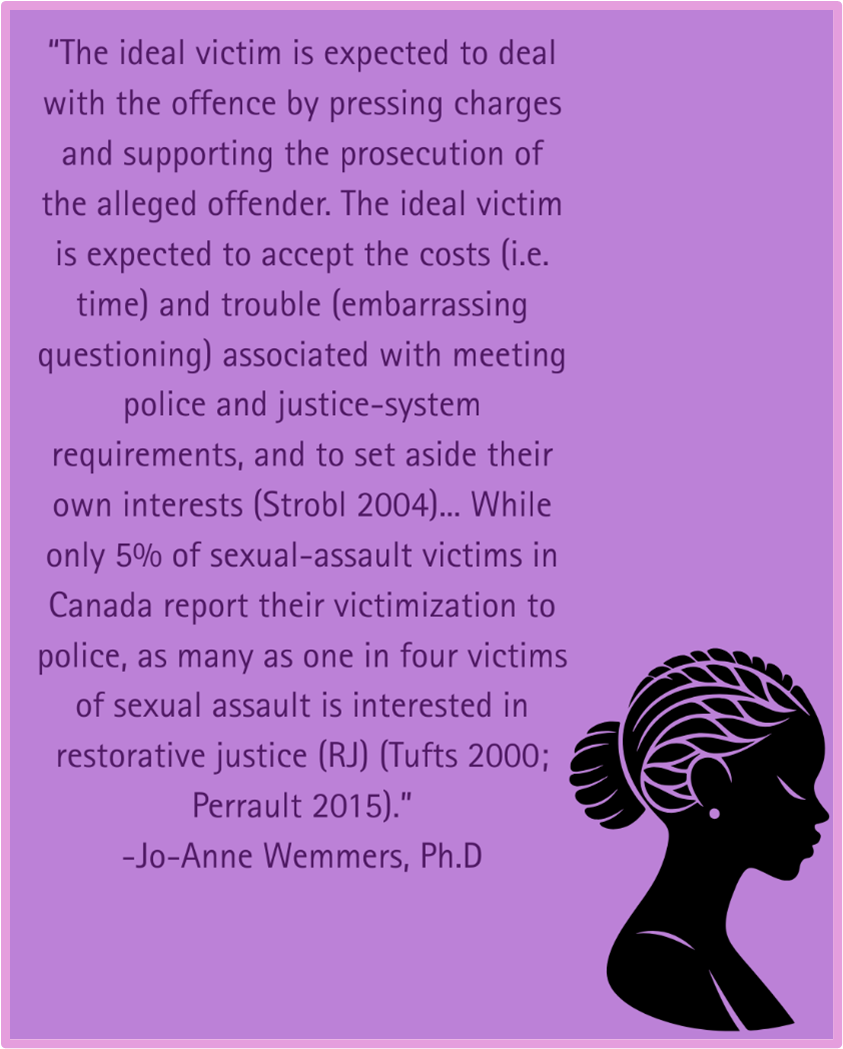
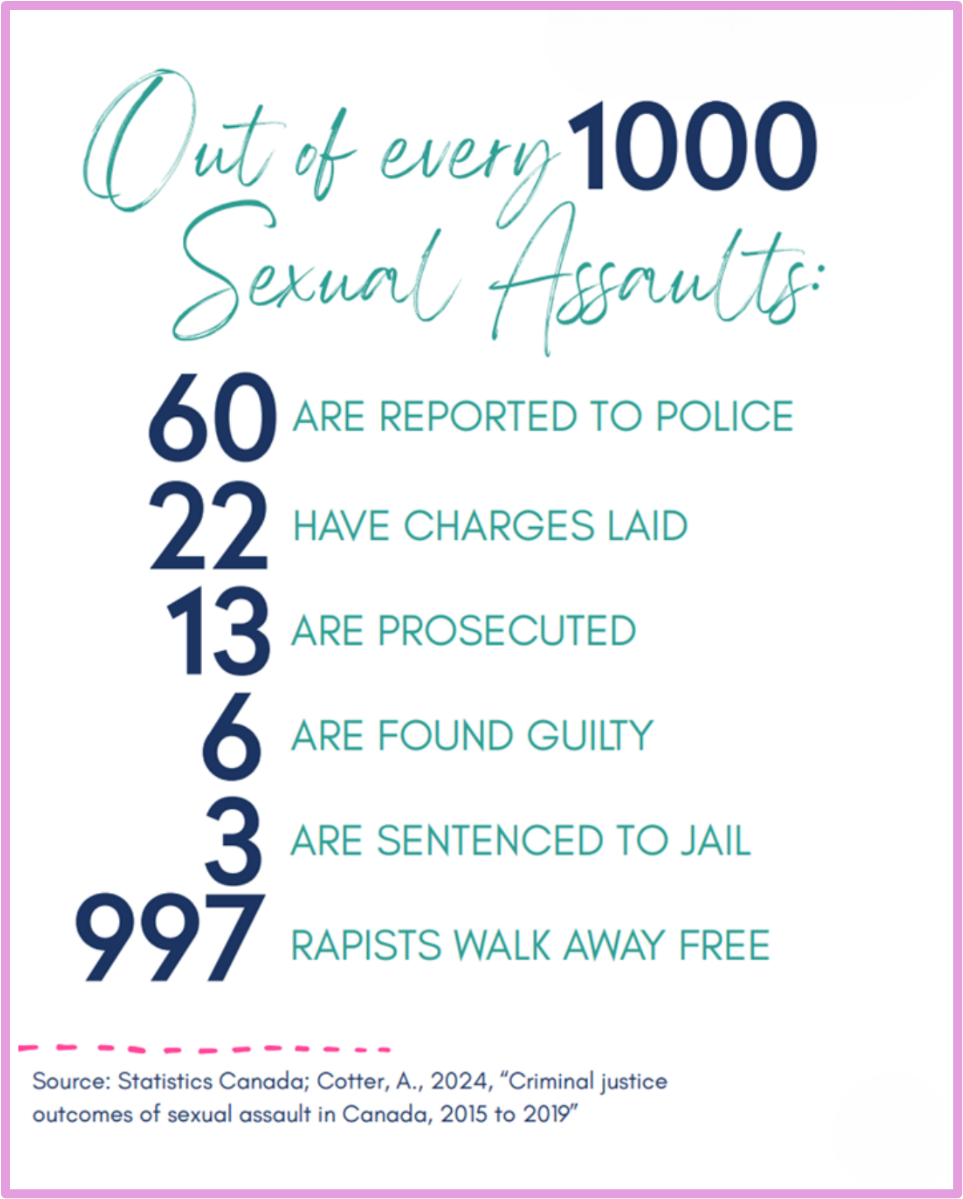
While some women who have experienced violence find seeking justice through the justice-system to be important or even empowering, others may find the costs of significant time away from their regular lives, public questioning and often ridicule to be too high for such slim chances of a guilty verdict. We can’t assume either that a guilty verdict is the desired outcome for a survivor. How can we make more room for those who experience violence to imagine what justice can look like, and move towards those systems?
Legal Advocacy at Huronia Transition Homes
Huronia Transition Homes operates La MaisonRosewood Shelter in Midland as well as the Athena’s Counselling and Advocacy Centre in Barrie with satellite locations across Simcoe County. We understand that especially for women in rural and remote settings, transportation can present a major barrier to accessing supports; legal advocacy is available at any of these locations, or virtually). Our legal advocate is there to support women through the legal options around reporting sexual assault to the police. If a woman does decide to report a sexual assault, and charges are laid, our legal advocate will inform them about next steps in the process, provide in-person support when reporting, guide them through the legal process when case goes to trial, and is always available to answer any questions on sexual assault, harassment, and inform women of their rights.
Learn more here: What legal supports or services are available to me?
Media and Sexual Violence
We, the public, shape the stories and tone of the media, and in return the media shapes us. From sources including radio, television, news headlines and stories, social media, podcasts, books and music, our cultural perspective around sexual violence is being informed.
Media plays a critical role in reshaping narratives, raising awareness, and holding space for conversations that can help prevent further violence.
Consider some of the myth-busters from Anova’s #WeBelieve campaign Resource Booklet to the right. What myths are more or less believable to you? What media has impacted how you think about these myths?
Below you will see a poignant example that Anova has provided of news headlines perpetuating the idea that those accused of sexual violence require all the compassion we can muster, while those who report sexual violence are hyper-sexualized.
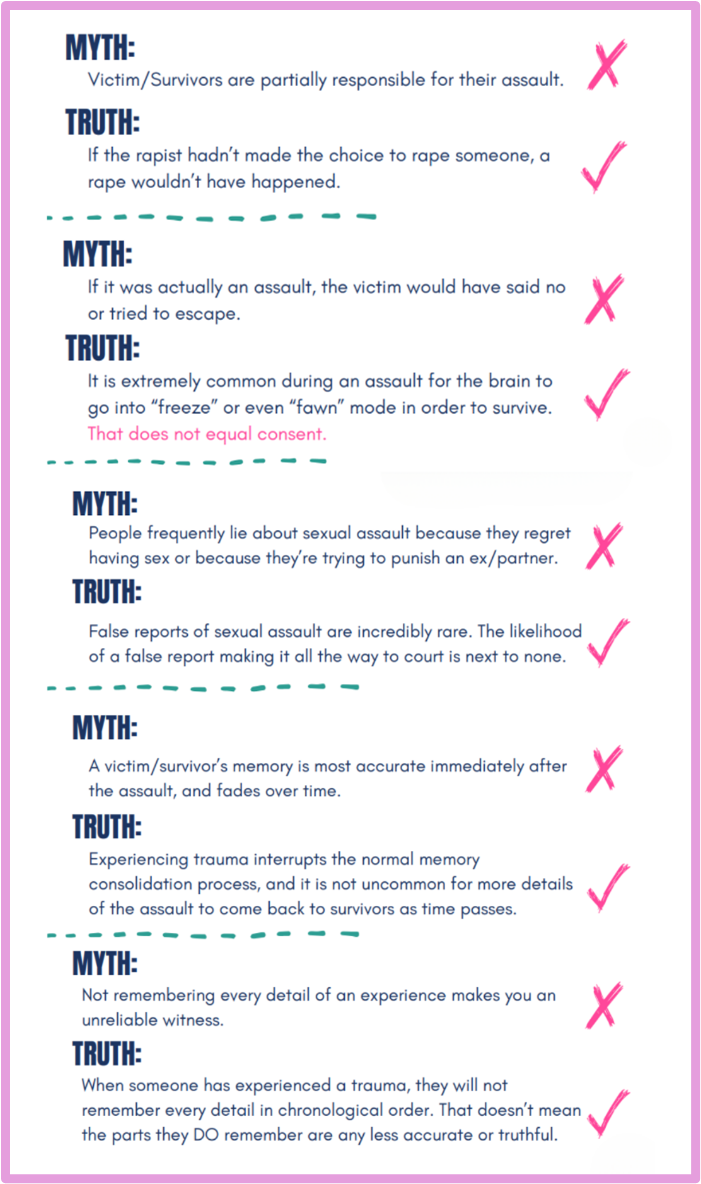
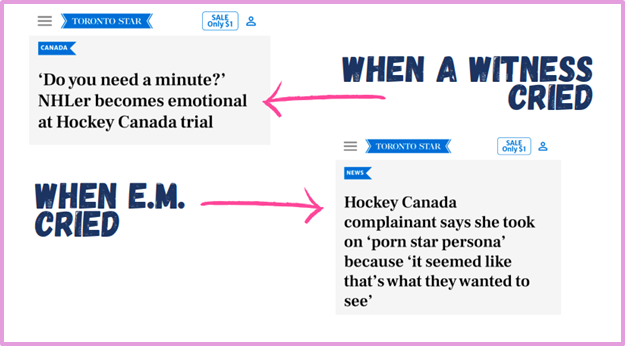
Media Training with Huronia Transition Homes
In April of 2025, HTH hosted a media training in response to the media coverage of the tragic femicide of Julia Brady in Midland in the summer of 2024. This death underscored the urgent need for media in Simcoe County to respond more responsibly and actively to the epidemic of gender-based violence. The training focused on disrupting harmful narratives and challenging dominant discourses surrounding violence. We called for a shift in how we conceptualize and address Gender-based Violence, fostering a deeper understanding of its impact. Participants gained valuable insights into advancing more equitable and representative narratives, while exploring pathways for meaningful action and change. This event also provided opportunities to build knowledge and establish sustainable, collaborative relationships with the Gender-based Violence sector, empowering media professionals to contribute to a more informed and compassionate approach to reporting. We have more work to do in collaboration with our local media sources, and we need them to continue to show up with us. It's time for the media to take a stand in promoting safer, more equitable communities for all.
Learn more here: Intimate Partner Violence is an Epidemic
Counselling, Advocacy and Support through Huronia Transition Homes
Athena’s Counselling and Advocacy Centre in Barrie and at satellite locations in Midland, Alliston, Orillia and Collingwood provides free and confidential counseling and support through self-referral. Whether a woman or gender diverse person (above the age of 16) has experienced any form of sexual abuse in the past or recently, Athena’s counselling support program focuses on minimizing the impact of trauma, developing skills for coping, self-regulation and emotional regulation, and moving forward with more freedom and choice. At Huronia Transition Homes, we use a trauma-informed and non-clinical approach. This means that there is no requirement to talk about, or recall a traumatic event, or experience of violence. Women will not be made to feel responsible for the violence they have experienced, and their goals guide the recovery process.
Learn more here: Where do I access support if I am a woman, identify as a woman, and am
Sports Culture and Sexual Violence
The culture surrounding most sports, especially hockey, is one of hegemonic masculinity because it is traditionally a very male-centered space. “Hegemonic” masculinity means the kind of masculinity that is most dominant or normal in our culture. In sports culture today, hegemonic masculinity can look like hyper-competitiveness, excessive risk-taking, stigmatization of accessing care, belittling the emotions of others or oneself, the objectification and hyper-sexualization of women and girls, homophobia and transphobia and seeing violence as a viable solution to problems. Consider the definitions of “accountability” that Anova provides to us and this quote from masculinity scholar Jackson Katz on cultures of domination:
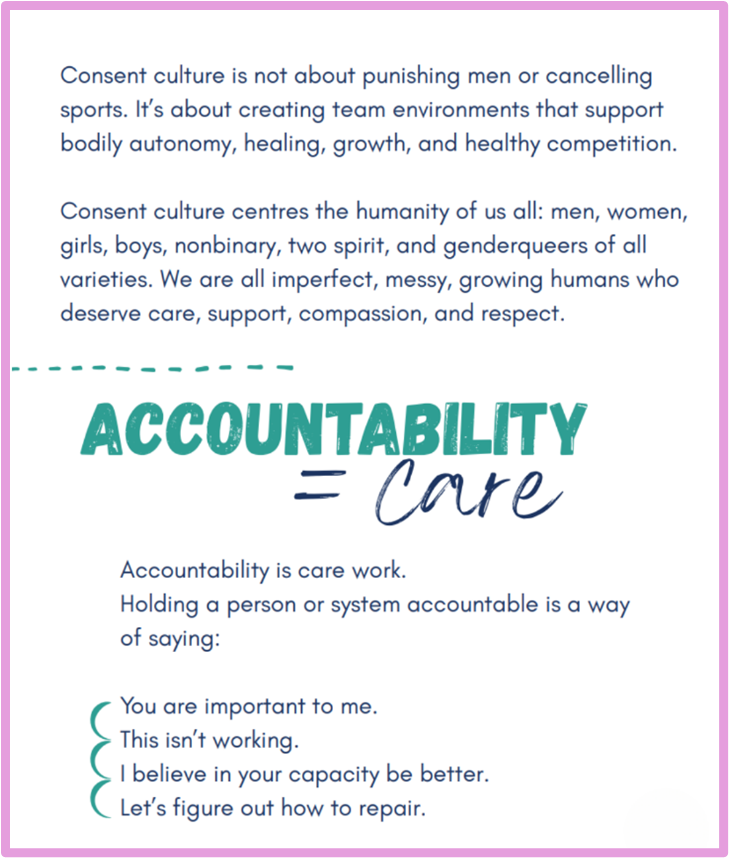
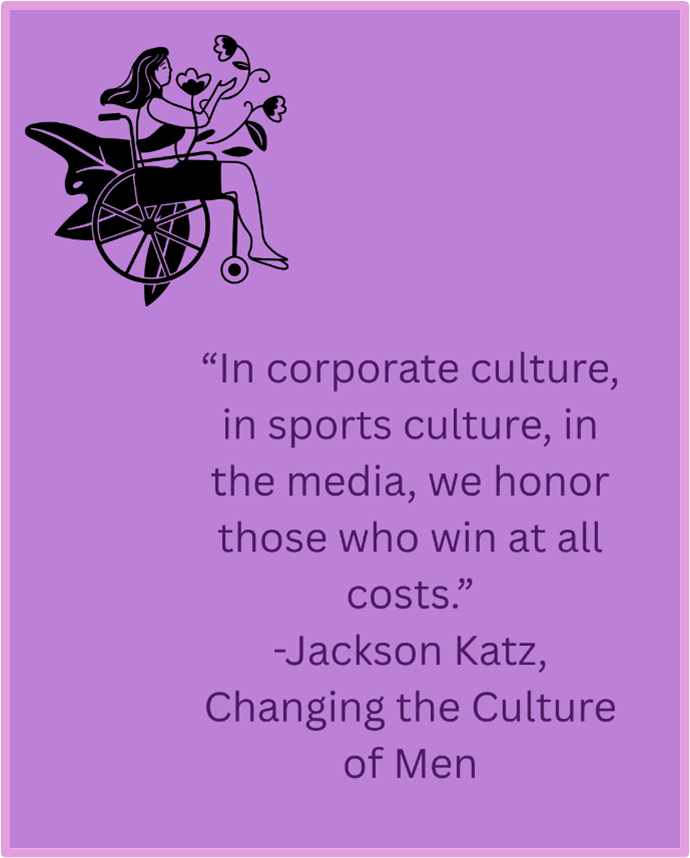
Sports Culture with Huronia Transition Homes
In partnership with the Ontario Hockey League, Huronia Transition Homes facilitates the OHL ONSIDE training to our local team, the Barrie Colts. OHL ONSIDE is a two-hour, in-person training for players and team personnel. It focuses on consent, bystander intervention, gender-based violence prevention, and creating a culture of respect - on and off the ice. The training was originally developed in 2015 by the Sexual Assault Support Centre of Waterloo Region (SASC) and the Kawartha Sexual Assault Centre (KSAC), in collaboration with the Ontario Hockey League. It is grounded in best practices for prevention and informed by decades of experience supporting survivors and providing education on healthy relationships. Engaging young male athletes in conversations about consent, respect, and accountability is a vital part of preventing sexual violence. These players are not only leaders on the ice; they are influential role models in their schools and communities. We know that aspects of toxic masculinity within hockey culture - including entitlement, hyper-competitiveness, homophobia, and the silencing of vulnerability - can contribute to environments where sexual violence is minimized or excused. OHL ONSIDE creates space for young men to challenge these harmful norms and explore healthier, more respectful ways to relate to themselves and others.
Learn more here: OHL ONSIDE Program - Ontario Hockey League
Education with Huronia Transition Homes
Huronia Transition Homes offers speaking engagements and public education workshops for secondary and post-secondary schools, community groups, professional organizations, and more. Workshops engage audiences in a dynamic and collaborative learning environment and aim to educate and advocate to end all violence against all women and girls. Depending on the need, the Community Development Coordinator will work with an organization, school, or business and deliver education around a variety of topics including Harm Reduction, Rape Culture, Healthy Relationships, Consent, Power, Privilege, & Oppression and Digital Abuse. All workshops are made accessible and delivered through an intersectional feminist framework.
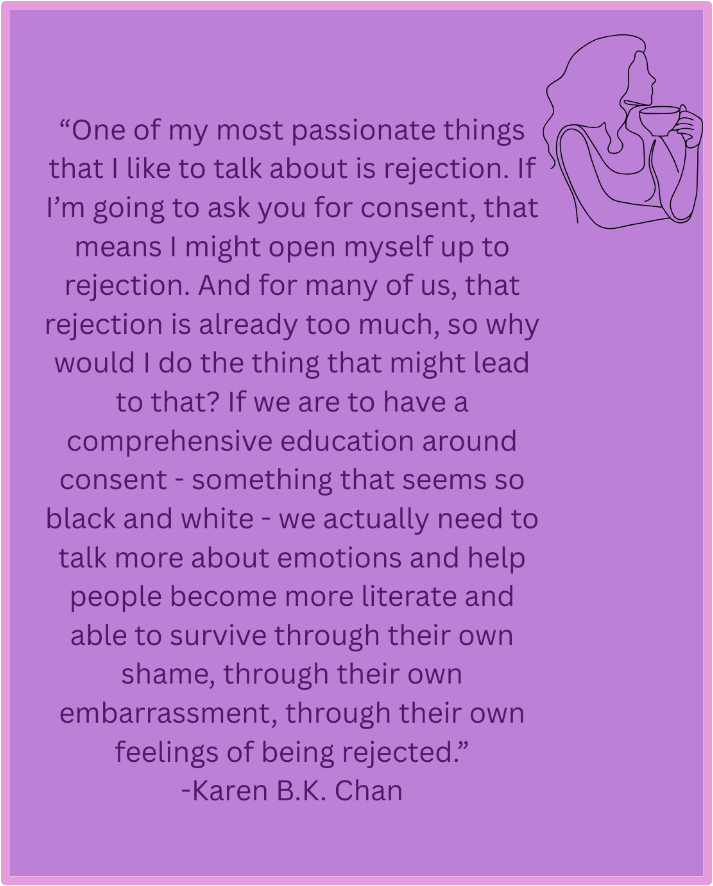
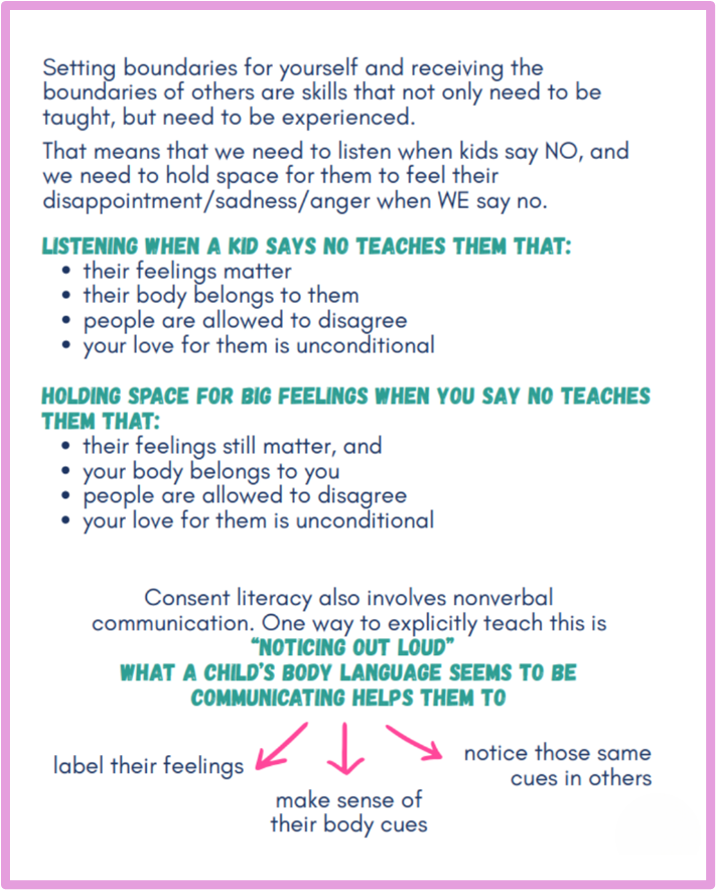
Relationships and Sexual Violence: Our Call to Action!
We have heard this story too many times. As Sexual Assault Support Centres, as Women’s Shelters, as Consent Educators, as people who long to feel safe and included in our communities, we have been asking for generations for bodily autonomy: the ability to decide for oneself what happens with their body. We are asking our sexual and romantic partners to care more about our comfort and safety than they care about fulfilling any sexual fantasy, because we cannot experience desire without first experiencing safety. We are asking the media to care more about the impact of their messaging on cultural norms than they care about maximizing clicks or likes or engagement through the sensationalization of the violence we experience. We are asking sports industries to prioritize being a positive role model for healthy masculinity, because they have real power to prevent violence. We are asking mental health professionals to avoid pathologizing the experience of a victim / survivor / woman / human and instead consider that there may be something psychologically unhealthy in a society that condones and perpetuates violence. There is so much that we ask of the justice system on our path to a world where all beings are free, and we need the allyship of our partners, families, communities, the media, schools, the mental health industry, the sports industry and all factions of life as we continue to work towards a more just society. These asks have been made in desperation, in anger, in love, in patience, in urgency, over and over again and hang, suspended in the air over our heads across generations. They are invitations waiting to be plucked out of the air by anyone at anytime, and they are invitations to co-create a world with more freedom and compassion for everyone.
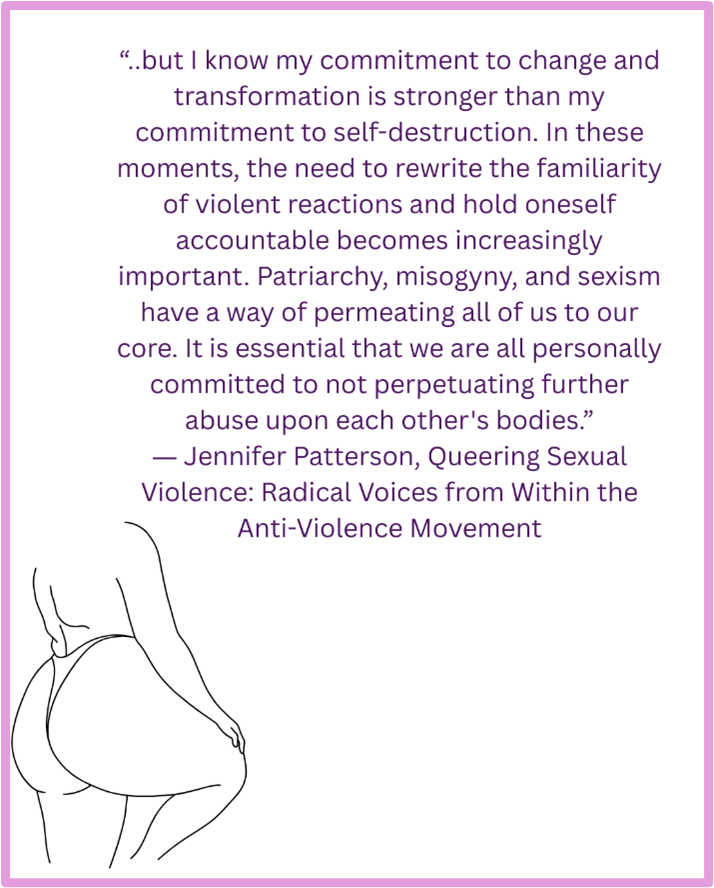
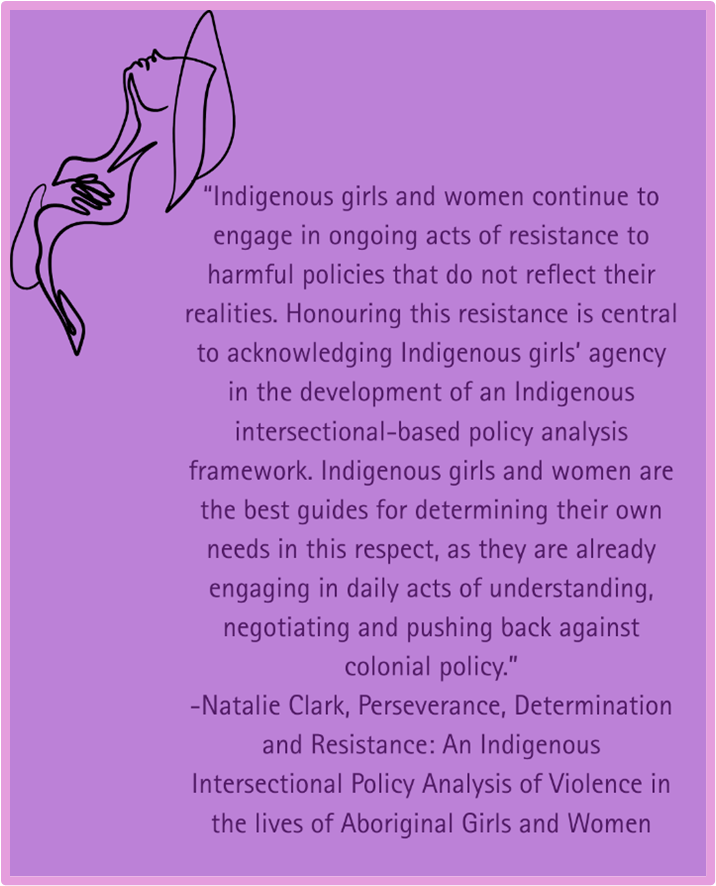
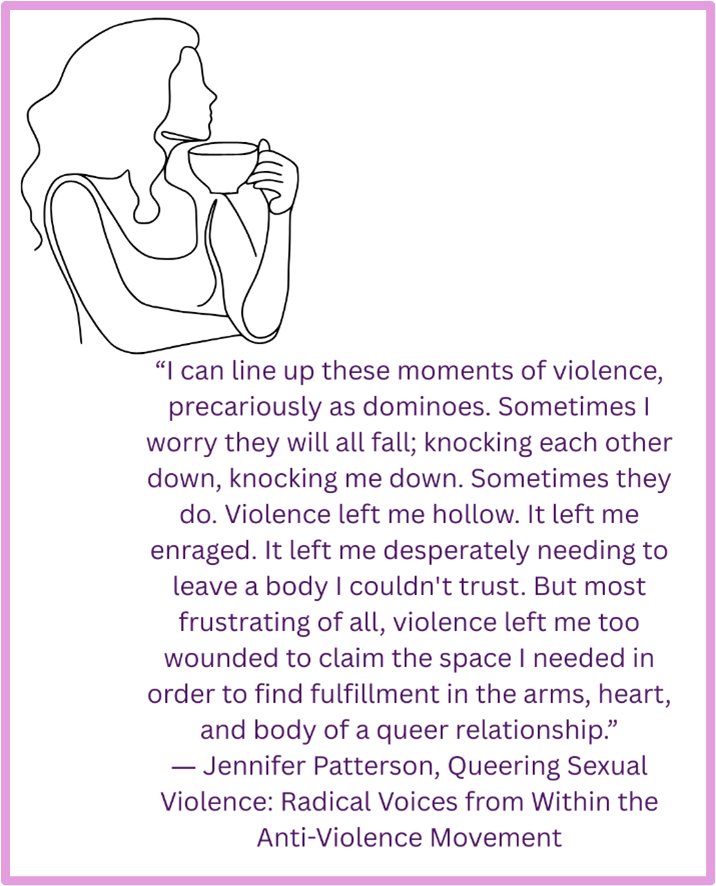
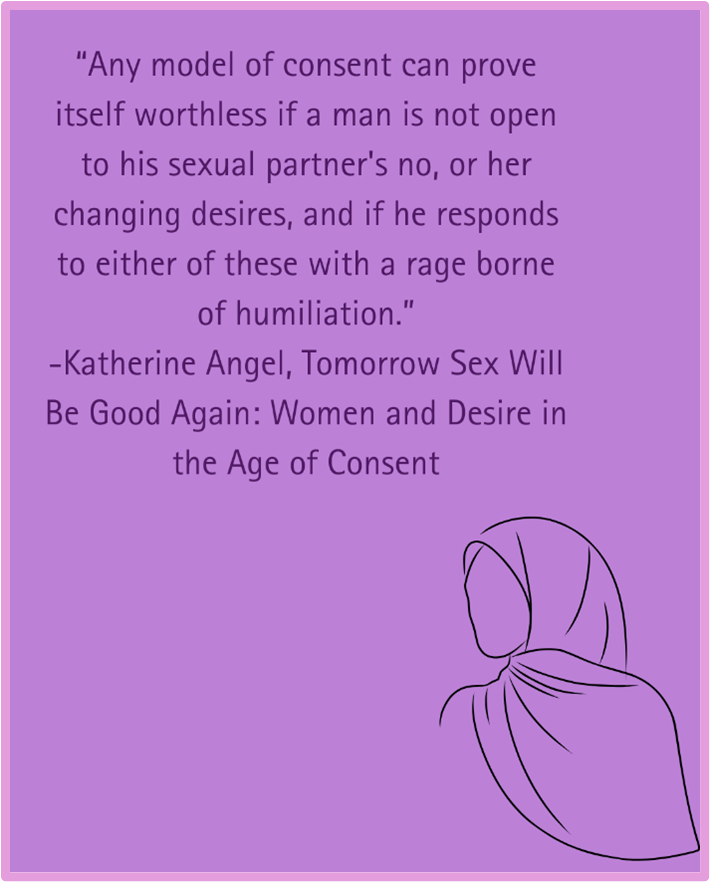
resistance is a woman
whose land is all on fire
perseverance and determination
are her daughters
she is a palestinian mother who
hands her children a legacy of
war together with the
weapons to fight in it
she is a black woman draped
in purple satin who strolls
down a runway allowing only
the clothes she wears to be sold
resistance is the absent native woman
who died at the hands of a white artist
who lives inside herself
while thriving inside of me
resistance is a girl child who
witnesses her mother’s death and
swears to survive no matter
where the hiding place
she is a woman beaten with hate
by the man she loves who
decides to escape to a world
where touch is sacred
resistance is the woman who defies
the male definition of love
and loves another woman
then heals an entire nation in doing so
she is a woman torn apart by
the barbed wire surrounding her home
who plots a way out
despite the consequences
resistance is every woman who
has ever considered taking up
arms writing a story leaving the abuse
saving her children or saving herself
she is every woman to dares
to stage a revolution complete a novel
be loved or change the world
resistance walks across a landscape
of fire accompanied by her daughters
perseverance and determination
in The Colour of Resistance: A Contemporary Collection of Writing by Aboriginal Women (Sister Vision Press, 1998)
References
Clark, Natalie (2012). “Opening Pandora’s Box: Girls Groups and Trauma-informed Intersectional Practice.” Moving the Addiction and Mental Health System Towards Being more Trauma-informed.
Clark, Natalie (2013). “Perseverance, Determination and Resistance: An Indigenous Intersectional Policy Analysis of Violence in the Lives of Aboriginal Girls and Women.”
Chan, Karen B.K. (2019). “Talking your way to better sex.” Talking your way to better sex by B.K. Chan
Crenshaw, Kimberle (1989). “Demarginalizing the Intersection of Race and Sex: A Black Feminist Critique of Antidiscrimination Doctrine, Feminist Theory and Antiracist Politics.”
Fife, Connie (1998). “Resistance.” The Colour of Resistance: A Contemporary Collection of Writing by Aboriginal Women (Sister Vision Press, 1998).
Herman, Judith L., MD (2023). “Truth and Repair: How Trauma Survivors Envision Justice.”
Katz, Jackson (2015). “Changing the Culture of Men.” Jackson Katz: Changing the Culture of Men
Million, Dian (2014). “There is a River in Me.” Theorizing Native Studies.
Patterson, Jennifer (2016). “Queering Sexual Violence: Radical Voices from Within the Anti-Violence Movement.”
Wemmers, Jo-Anne, PhD (2021). “Judging Victims: Restorative choices for victims of sexual violence.” Victims of Crime Research Digest No.10: Judging Victims: Restorative choices for victims of sexual violence - Victims of Crime Research Digest No. 10






